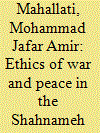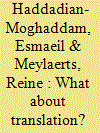|
|
|
Sort Order |
|
|
|
Items / Page
|
|
|
|
|
|
|
| Srl | Item |
| 1 |
ID:
141267


|
|
|
|
|
| Summary/Abstract |
This article provides an overview of the ethics of war and peace in the most important and normatively influential work of epic literature known in the eastern lands of Islam, namely the Shahnameh of Ferdowsi (d. 1020 CE). As one of the greatest sources of the Iranian cultural identity for over a millennium, Shahnameh (lit. The book of kings) defines normative ideals in the ethics of war and peace within narratives that connect the ancient history of Iran to its mythical eras and in effect to both the medieval time of the epic’s authorship and modern Iranian identity. By identifying limits, standards and legitimacy for war and peace in Shahnameh, this article aims to facilitate an Iranian contribution to the global literature and practice on peacemaking that has deep roots in the Islamo-Persian tradition.
|
|
|
|
|
|
|
|
|
|
|
|
|
|
|
|
| 2 |
ID:
141266


|
|
|
|
|
| Summary/Abstract |
One of the most exquisite illustrated books produced under the patronage of Shahrukh is a copy of Majmaʿ al-Tawarikh which was widely dispersed during the twentieth century. The dispersal of the manuscript has strongly influenced and limited its scholarly examination. The present research has traced the folios of this manuscript in numerous collections. By means of comparison with other dated codices, the illustrations of the dispersed manuscript can be classified into three distinctly different groups. This article gives an explanation of why these three styles appear side by side in the manuscript. Thereafter, it focuses on the problem of the authenticity of some of the illustrations of the manuscript.
|
|
|
|
|
|
|
|
|
|
|
|
|
|
|
|
| 3 |
ID:
141264


|
|
|
|
|
| Summary/Abstract |
As is still the case in many parts of Iran, the distribution of languages and dialects in Ilam Province, western Iran, is unevenly documented. There have been several studies on specific language varieties spoken throughout the province but, in large part because of conflicting perspectives on the relationship between language and ethnicity, the situation for the region as a whole has until now remained unclear. The present study first of all brings together existing sociolinguistic and demographic data on language distribution and highlight areas of uncertainty. The main part of the study provides an overview of local perceptions of language distribution and language use based on field research and interviews conducted in each of the province's ten regions (shahrestān) and their twenty-five districts (bakhsh). Here, respondents' assessments of the geographic extent of the province's four main languages—Kurdish, Luri, Laki and Arabic—as well as more minor languages spoken by immigrants from elsewhere in Iran are summarized. For Kurdish in particular, which is the major of the four languages, the article shows the perceived geographic distribution of each major dialect and its affiliation within one of two major Kurdish dialect groups: Ilāmi (or “Feyli”) and Kalhōri. This analysis is followed by a brief discussion of multilingualism. The results of the study are brought together in a map of the province's languages.
|
|
|
|
|
|
|
|
|
|
|
|
|
|
|
|
| 4 |
ID:
141268


|
|
|
|
|
| Summary/Abstract |
In this article I examine the debate over the character of Cyrus the Great in Iran during the last four decades, using it as a prism to view the struggle over the desired balance between religious and ethnic components of Iranian identity. Heated polemics over the historical figure of Cyrus and his legacy reveal undercurrents of Iranian identity dilemmas as well as different and conflicting views of Iranian identity. Beyond a mere historical or religious controversy, the debate over the “right” memory of Cyrus presents an interesting case of shifting emphasis on identity and sources of political inspiration in Iranian society from the late 1960s to the present. Moreover, putting the debate over the ancient king in perspective, there emerges a wider picture of religious adaptation and embrace of what once seemed pagan or secular.
|
|
|
|
|
|
|
|
|
|
|
|
|
|
|
|
| 5 |
ID:
141269


|
|
|
|
|
| Summary/Abstract |
Javad Tabatabai, a leading theorist and historian of political thought in Iran, has presented a controversial theory regarding the causes of the decline of political thought and society in Iran over the last few centuries. His ideas on Iranian decline have affected the intellectual debates on modernity and democracy currently underway in Iran. Tabatabai's career-long research has revolved around this question: “What conditions made modernity possible in Europe and led to its abnegation in Iran?” He answers this question by adopting a “Hegelian approach” that privileges a philosophical reading of history on the assumption that philosophical thought is the foundation and essence of any political community and the basis for any critical analysis of it as well. This article critically engages with Tabatabai's ideas of “crisis,” and “decline” by challenging his exposition of the Persian tradition.
|
|
|
|
|
|
|
|
|
|
|
|
|
|
|
|
| 6 |
ID:
141265


|
|
|
|
|
| Summary/Abstract |
Against the background of language policy research on Iran, and drawing on insights from recent scholarship on the role of translation in language policy, this article calls into question the claim that “Persianization” of non-Persian peoples is the main element of language policy in Iran. In so doing, the article examines closely the role of translation as enacted in two legal instruments: the Constitution of the Islamic Republic of Iran and the Law of Parliamentary Elections. The study illustrates that although official communication between Iranian authorities and citizens is a prototypical example of monolingualism and non-translation, voluntary translation happens between Persian and non-Persian speaking individuals, acting as a viable and cost-effective bottom-up alternative for the inclusion of non-Persian speaking peoples, far more effective than an impractical, top-down language policy reform implicitly found in the “Persianization” claim.
|
|
|
|
|
|
|
|
|
|
|
|
|
|
|
|
|
|
|
|
|